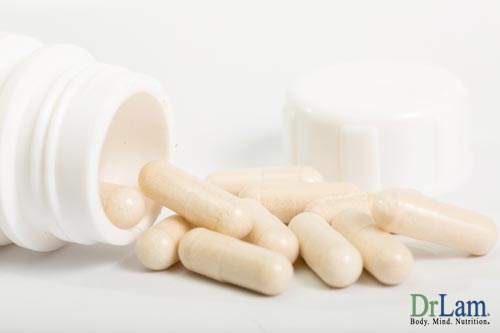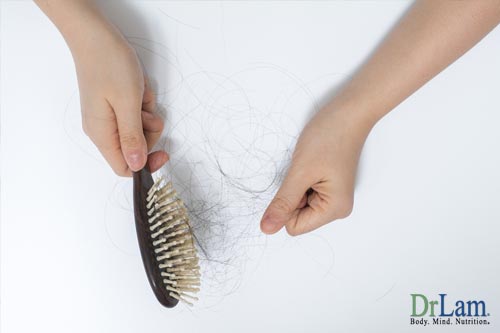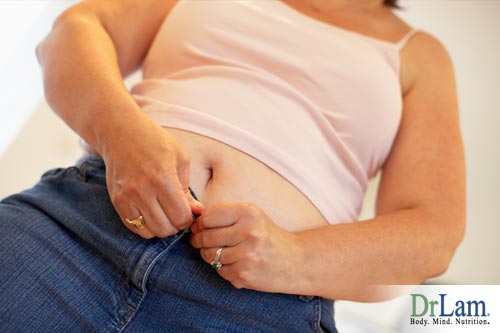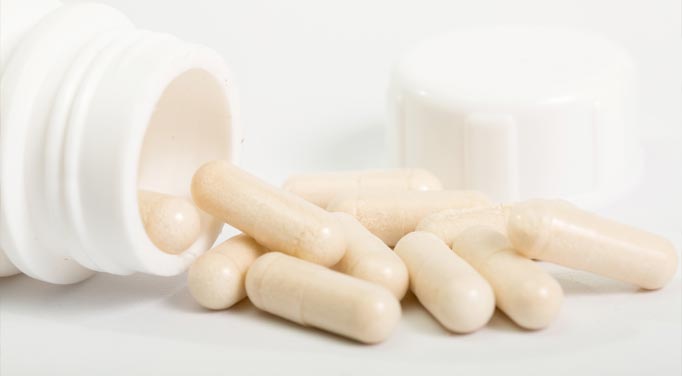 Polycystic ovarian syndrome (PCOS) is a condition that can strike any woman of childbearing age. It is an endocrine condition whereby your hormones are no longer in balance. This causes a number of health problems, such as problems with fertility, heart disease, and even diabetes. The exact cause of PCOS is, however, unknown, and most medical treatments focus on treating each individual symptom and not the actual problem. Using inositol for PCOS, however, does seem to alleviate many of the underlying problems associated with the condition.
Polycystic ovarian syndrome (PCOS) is a condition that can strike any woman of childbearing age. It is an endocrine condition whereby your hormones are no longer in balance. This causes a number of health problems, such as problems with fertility, heart disease, and even diabetes. The exact cause of PCOS is, however, unknown, and most medical treatments focus on treating each individual symptom and not the actual problem. Using inositol for PCOS, however, does seem to alleviate many of the underlying problems associated with the condition.
Chronic stress causes hormonal imbalances. Cortisol plays a large role in body functions and metabolism control. It affects your immune system, insulin sensitivity, and blood flow.
When in any stressful situation, these factors play an essential role in your survival. Functions that are not deemed essential for your immediate survival are put on the back burner. These include: digestion, reproductive function, bone formation, and more. Thus, when you are presented with such a situation, the cortisol production immediately increases (readying your body for fight or flight) while non-essential functions are reduced or stopped for the duration of the situation.
However, when your body is subjected to constant stress, the increased cortisol production means these functions are not resumed as they are supposed to be. This leads to complications, and many of these complications are directly linked to hormonal imbalances.
The part of the endocrine system that regulates cortisol and the production of other hormones is known as the hypothalamic-pituitary-adrenal (HPA) axis. A stressful situation sees the hypothalamus release hormones that in turn signal the pituitary gland to also secrete hormones. These hormones then indicate to the adrenal glands that cortisol and adrenalin are needed to ready the body for confrontation or flight. This is an automatic response over which you have no control.
Additionally, the pituitary gland’s hormones signal the gonads to produce estrogen and progesterone. Estrogen regulates your menstrual cycle and plays a huge role in the development of secondary female characteristics while you go through puberty. Progesterone, on the other hand, is the precursor to estrogen, testosterone, and also cortisol.
The problem arises when you are under constant stress. The body immediately prioritizes the use of progesterone – making use of it to produce ever increasing amounts of cortisol in able to cope. The result is less progesterone that is available for the manufacture of other hormones. A hormonal imbalance is thus the result.
One of the factors that play a large role in PCOS is a hormonal imbalance. Another problem associated with the constant increase in cortisol production is insulin resistance. When you are subjected to a stressful situation, cortisol taps into your protein stores in order to provide your body with the energy it needs to either fight or flee.  This is done in the liver via a process known as gluconeogenesis. Constant stress and the resulting higher cortisol production, however, causes the production of ever increasing quantities of cortisol. At the same time, cortisol inhibits the production of insulin, while the pancreas works harder to try and rectify the glucose levels in the body. This could lead to a defective pancreas which results in insulin resistance and possible diabetes.
This is done in the liver via a process known as gluconeogenesis. Constant stress and the resulting higher cortisol production, however, causes the production of ever increasing quantities of cortisol. At the same time, cortisol inhibits the production of insulin, while the pancreas works harder to try and rectify the glucose levels in the body. This could lead to a defective pancreas which results in insulin resistance and possible diabetes.
The elevated cortisol production also plays a major role in gaining weight – especially around the belly area. During stressful situations, cortisol removes fat from healthy areas such as the thighs and buttocks, and deposits it in the abdominal area as it has more cortisol receptors and thus assists with the production of even more cortisol. To make matters worse, much of this fat is deposited around your organs, increasing inflammation in your body as well as insulin resistance. The result is a vicious cycle where cortisol becomes an enemy of sorts. Although it is responsible for the protection of your body, the elevated, prolonged production of a hormone necessary for survival now becomes your body’s worst enemy. It is actually contributing towards your adrenal fatigue and possibly even PCOS. Research, however, has indicated that inositol for PCOS actually works towards rectifying the hormonal situation.
Inositol occurs naturally and is to be found in plants, animals, and of course, the human body. It plays a role in stabilizing hormones and other chemicals. One of its functions has to do with the insulin receptors that are found in cells. It aids in allowing the receptors’ efficiency to be boosted so that insulin binds to its receptors correctly. This implies the pancreas does not have to work so hard at producing insulin.
Inositol also decreases testosterone (of which the precursor is progesterone) in men and women. High testosterone levels in women are one of the reasons they find getting pregnant difficult. This thus implies that more progesterone is available for the formation of other necessary hormones.
Additionally, inositol also works in the brain where it increases your serotonin (a feel-good hormone) levels and works with this hormone to combat anxiety and depression. As your serotonin levels rise, so does that of your dopamine. These two hormones help regulate mood.
When your mood improves, the fight or flight response is negated, which means that your adrenal glands are under less pressure to provide ever increasing levels of cortisol. The drop in your cortisol production and thus your body’s cortisol levels tends to have a cascading effect. The end result is that normal bodily functions are once more resumed, together with normal hormone production.
One commonality is that the level of inositol for PCOS sufferers is usually below the norm. They also have a number of common symptoms. Although you may not necessarily have all the symptoms associated with the condition, you should consult a healthcare practitioner if you find yourself with a few of the following:
 Hair loss on the head
Hair loss on the headHeadaches which result can be largely due to changes in hormone levels. Many women with PCOS also experience pelvic pain. This could be with or without having a heavy period.
Changes in hormone levels can cause acne, skin tags, and dark patches of skin. Hair loss on the head is related to PCOS and may increase as you get older.
PCOS is associated with general fatigue and low energy levels. Lack of proper sleep contributes towards this. Many women with PCOS suffer from insomnia. PCOS is also associated with mood swings, anxiety, and depression.
PCOS is one of the main causes of infertility in women. Many women with PCOS need fertility treatments in order to get pregnant, although some do manage to conceive naturally.
The use of inositol for PCOS sufferers has had thus far-reaching positive consequences:
 Weight gain is a problem associated with PCOS. Inositol helps reduces appetite and cravings while helping you to lose the additional weight. It helps control insulin as well as your blood sugar levels while increasing the release or leptin. Leptin is a hormone that not only reduces food cravings but promotes feelings of ‘fullness’ as well.
Weight gain is a problem associated with PCOS. Inositol helps reduces appetite and cravings while helping you to lose the additional weight. It helps control insulin as well as your blood sugar levels while increasing the release or leptin. Leptin is a hormone that not only reduces food cravings but promotes feelings of ‘fullness’ as well.Possible side-effects and contraindications should be carefully considered when using inositol for PCOS.
Inositol for PCOS, as a supplement, is deemed safe for most women. Some women have reported that they have experienced side effects such as diarrhea, nausea, and gas. High dosages of the supplement are known to cause this. There are conflicting reports on whether to take it on an empty stomach or after a meal. It is best to see what suits you.
Other side effects that have been reported include insomnia, headaches, tiredness, and dizziness.
It has also been noted that it seems to have a negative effect on those with a bipolar disorder. Some instances have been reported where it has actually exacerbated the condition. There is also concern that using inositol when you are bipolar could trigger mania. If you have this condition, look for an alternative course of action or consult your healthcare practitioner for their advice on the matter.
 It is not advisable to use inositol in conjunction with herbal supplements for depression, such as St. John’s Wort or prescribed medication. If you wish to go ahead and use inositol in these instances, it is best to consult a healthcare practitioner.
It is not advisable to use inositol in conjunction with herbal supplements for depression, such as St. John’s Wort or prescribed medication. If you wish to go ahead and use inositol in these instances, it is best to consult a healthcare practitioner.
When it comes to either pregnancy or breastfeeding, it is best to not use this supplement because there is not enough known about inositol in this regard as research is as yet inconclusive. It is always best to be safe.
The recommended dosage is between two and twelve grams daily, split up in either two or three dosages.
As a supplement for women with PCOS, inositol is certainly worth a try. It seems to be of great benefit when it comes to relieving many of the health issues associated with PCOS. It tends to address the root causes of many of the symptoms associated with this particular disorder.
© Copyright 2017 Michael Lam, M.D. All Rights Reserved.

